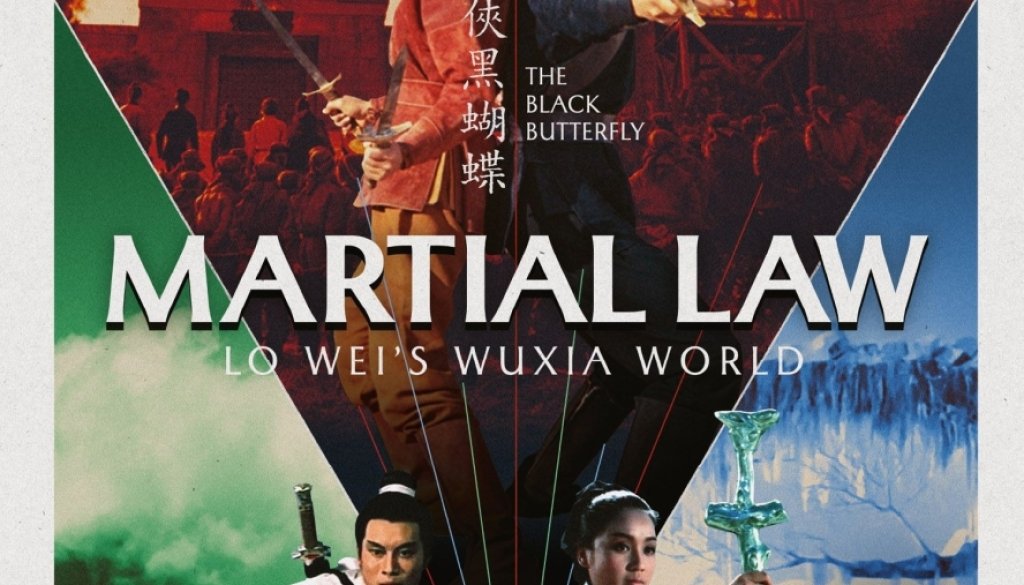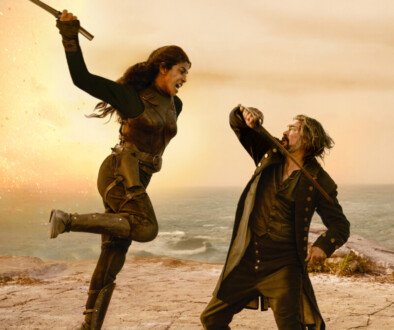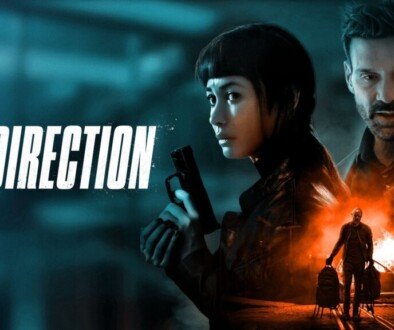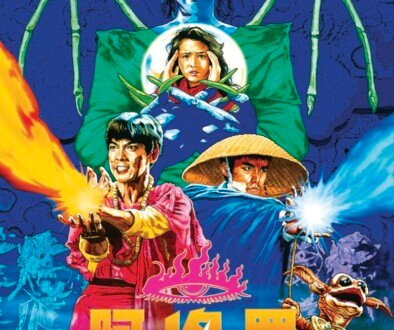Eureka Blu-Ray Review: In MARTIAL LAW: Lo Wei’s Wuxia World, A Worthy Snapshot Of A Celebrated Director’s Career
• THE BLACK BUTTERFLY
• DEATH VALLEY
• VENGEANCE OF A SNOW GIRL
• Extras
• Conclusion
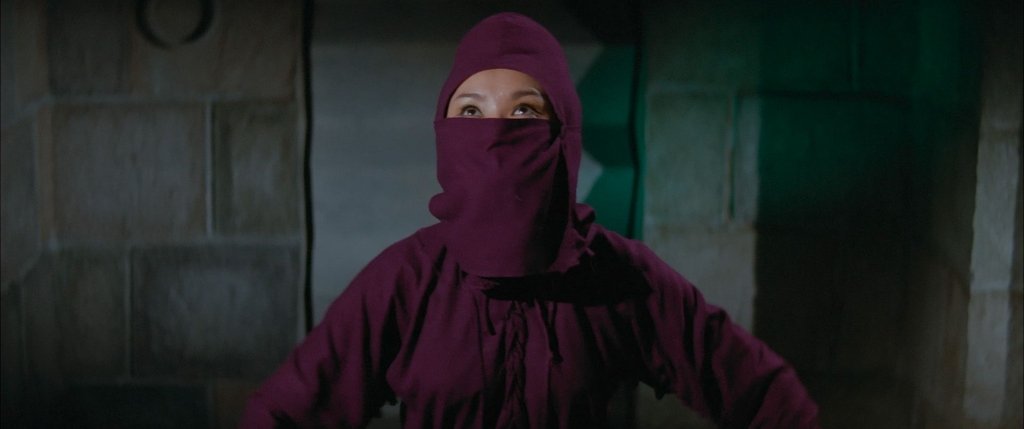
Legendary director Lo Wei is front and center once more for another dose of classic Shaw Brothers action by way of Eureka Entertainment with Martial Law: Lo Wei’s Wuxia World. The bundle herein lends restored classics including The Black Butterfly (1968), Death Valley (1968), and Vengeance Of A Snow Girl (1971), along with a lean addition of extras to boot.
The bundle also serves up an ample grouping of titles in which Lo himself also makes appearances. In The Black Butterfly, he plays Gai Tian Lui, the sinister head of Five Devil Rock whose collection of wealth is the latest ensnared by The Black Butterfly, a thief who haunts the night stealing from the rich to give to the poor. Efforts to investigate who the mysterious figure is and their whereabouts lead to a remote tavern run by Bao-zhu (Lisa Chiao Chiao), where a man known only as Drunken Beggar (Yang Chi-Ching) becomes the first of a few prime suspects.
Tensions heat up leading to the theft of royal seal at the hands of a tyrannical Chief beset by losing his wealth to the elusive Butterfly. When he challenges Bao-zhu’s father, the legendary swordsman Gold Sword Kwan Yee (Tien Feng) to reclaim the seal or see the slaughter of everyone in the region, the Butterfly must find the courage to risk the secrets they’ve kept in their years of training and justice to save the people from the corrupt and powerful, ensuing an all-out brawl at Five Devil’s Rock.
The performances are what you’d expect from a Shaw Brothers film – very different from its rivals at Golden Harvest, and most discernibly when it comes to the rehearsed, dance-like action sequences, wired stunts and trick cinematography for high leaps and bounds performed by the actors and the stunt performers. The film certainly makes its best case with its story, for the most part, with lead actress Chiao committing a ton of brilliance to her role in its various dimensions.
Lo is incredible as well as the main villain as well. This is actually my first time seeing him on screen apart from a few of his other works, including his 1976 successor with Jackie Chan in New Fists Of Fury which I’ve nearly completely forgotten since watching it on VHS back in the day. Here, he dominates in the role of a Chief with his own army, and a deadly fortress to boot.
The film also features a charismatic lead in Yueh Hua who plays Xi-Lang, who is charged with investigating who the Butterfly is, and who is also Kwan Yee’s pupil from martial upbringing. The two eventually join a nonet of heroes for the film’s climactic final act which gives you the impression that you’re watching a story about gallantry more than anything. It’s bloody, violent, dramatic as intended, and down-right feel-good by the end.

Lo’s screen credits continue on both sides of the lens in Death Valley, wherein the fate of two heroic swordsman collide in the wake of an insidious murderplot by Chien Yang (Angela Yu Chien) to claim the land and assete of her wealthy uncle, Yun Yang (Lo). The arrival of his heir apparent, Yu Lung (Yueh Hua) and the swordsman summoned to avenge Yun Yang, Chien Yang’s childhood friend, Chin Hu (Chen Hung-lieh).
The two warriors end up crossing paths and are bonded in battle, becoming friends, and even trading weapons out of admiration and goodwill; The latter results in a blaring case of mistaken identity that compels Yu Lung to pursue his latest lead in uncovering the mystery behind Yun Yang’s death. As the two men get closer to the truth, the two heroes are cajoled into a death duel before a shocking, fatal twist is revealed.
This film is certainly darker than The Black Butterfly, keen on heroic bloodshed aesthetics as we follow the story. The actors are great in their roles and the action here gets a tad more propulsive and thrilling than before. With Yu and Chin, you can’t help but sympathize with both of them, which makes the final act feel all the more ominous in the moments leading up to it.
There’s a great moment where Yu rescued by a young boy after being wounded in a previous battle, whereafter he takes vengeance following a tragic event, although peculiar watching things unfolds and trying to see if the tragedy has any bearing on Yu’s state of mind. Adding to the stakes is a moment when Chin makes a discovery that results in pitting him against Yu in their fateful duel in the titular valley. There’s a moment of optimism where you think they might finally clear their slates but evidently that’s not the case, and as with any heroic bloodshed tale, only one hero of the two is bound to make it out of this story alive.

Lo’s next appearence is a little smaller in Vengeance Of A Snow Girl, which is a story as much about redemption as it is vengeance. Shen Ping-Hung (Ching Lee) has an unassuming appearance as a cripple using a pair of jade crutches. Little does anyone know that one of them encases a legendary prized sword which she uses in the course of her life’s mission: to avenge her parents and kill the four men she holds responsible for destroying her life.
She’s killed two thusfar until her third intended target, renowned swordsman Kao Yun (Tien Feng) vows to relieve her of her grudge with two assets: The truth behind the incident, and a detailed plan involving a volcanic pearl, and a trip to a hot spring in the coldest most northern snowfield to heal her legs. Accompanied by his sons Tien-Ying and Tien-Wei, what follows is an epic journey of harrowing survival and deep introspection that, for the reluctant and venomous Ping-Hung, could alone be the healing touch she never knew she needed.
At a little over two hours, Vengeance Of A Snow Girl is the longest of the Martial Law trio. To that end, I think I enjoyed this one much more out of the bunch, particularly as a revenge film rich with tropes aplenty, including a stunning lead in Ching. Her performance is as scary as it demands, lending a brilliant combination of unassuming beauty and wily bloodlust, and there’s a scene a little later between Ping-Hung and Ting-Wei that elucidates this mood perfectly.
Adding to the film’s veracity is Master Tong (Ku Feng), the remainder of Ping-Hung’s two living targets. He is also father to the aforementioned Black Butterfly himself, the incorrigible Ming-zhu (Lisa Chiao Chiao) who is also Ting-Wei’s fiancée, setting up a psycholgical war of wits between Ping-Hung and her enemies.
The action is certainly one of the more interesting areas of this film among Lo’s filmography, as it pertains to illustrating a formidable fighting character in Ping-Hung. A lot of her exchanges are stationary as she uses her jade crutches as fencing placeholders, and unsheathing her Jade Phoenix sword right when she deems it necessary to kill. In between the choreography, Lo finds ways to keep her mobile during these scrimmages, whether they involve leaping over small hurdles, or the use of wirework to add an air of grace and elegance to her near-boundless arsenal.
The ending was somewhat disappointing in terms of the film’s tragic and self-sacrificial aspects. There’s a beauty in the aesthetic, although it still feels like a happier ending could have been written and either Lo or Ni said “…Naaah.” Ultimately, it does put a damper on things but that’s heroic bloodshed for you. It’s par for the course for the Shaw brand of its time, and it works for what it is with its target niche.

Eureka’s Martial Law: Lo Wei’s Wuxia World comes with a limited edition O-card slipcase featuring new artwork by Grégory Sacré (Gokaiju), as well as a limited edition collector’s booklet featuring new writing on all three films by Hong Kong cinema expert Camille Zaurin. The films are presented in 1080p HD with optional English subtitles and original Mandarin audio, as well ad new audio commentaries on all three features by Mike Leeder and Arne Venema; Due to time constraints, I couldn’t listen to the commentaries, but if you’ve purchased titles like these before and have listened to Leeder and Venema in the past, then you know you’re in for a good time.
The first two titles are included on one disc. The third is featured a second disc along with a twenty-minute video essay titled “A Dish Best Served Cold” in which film scholar Wayne Wong dives into Vengeance Of A Snow Girl to reflect on Lo’s longstanding legacy and career in film. There aren’t any individual trailers for the films but I reckon you can find those somewhere online to satisfy your tastes.
Chang Cheh and Lo Wei continue to be new areas of film for me since I began my deep dive in the late 90s via Golden Harvest. I still favor the brand, while I’m a much older consumer and share an appreciation in the richness and craft of wuxia in its various aspects as the building blocks for what the genre is today. I still crave some of King Hu’s works, and would love to venture into those in due time.
As for Eureka’s latest release, it’s not as loaded as others, but it’s a pretty lean package with far less overkill in terms of extras. If you love classic wuxia and physical media without the frills, Eureka’s Martial Law: Lo Wei’s Wuxia World is a keeper.
Native New Yorker. Been writing for a long time now, and I enjoy what I do. Be nice to me!

